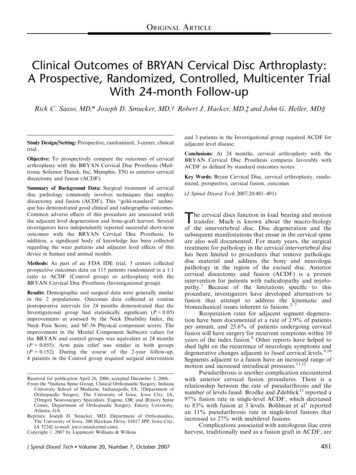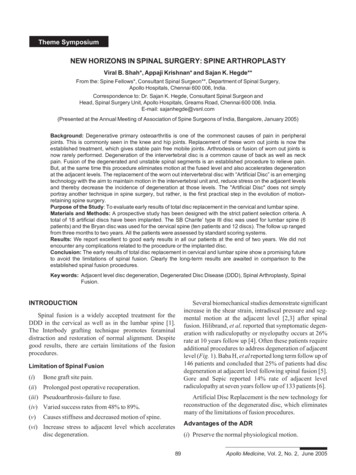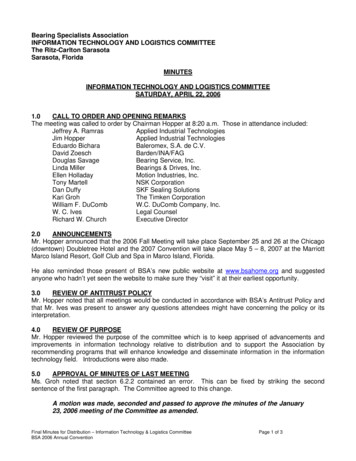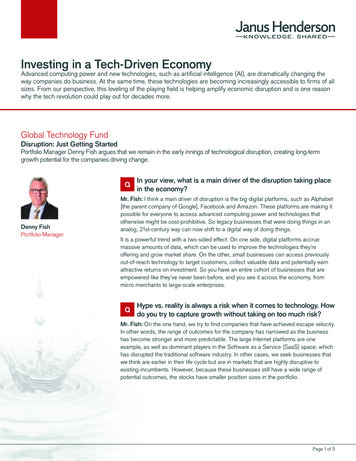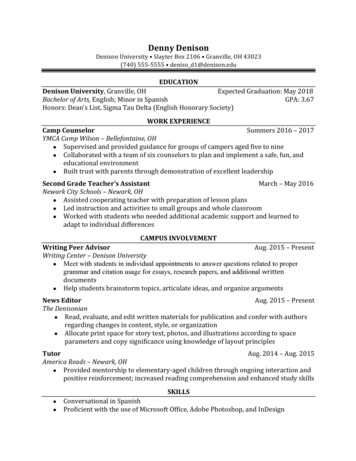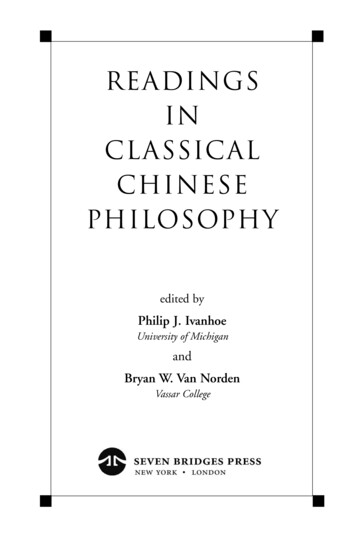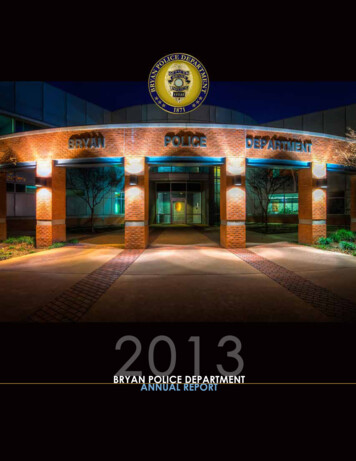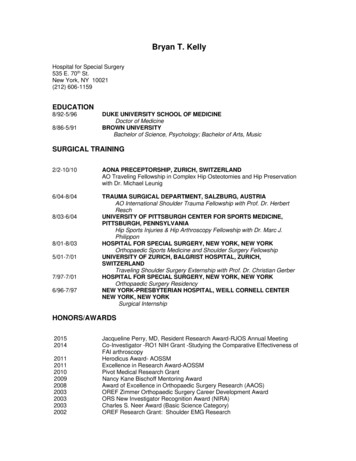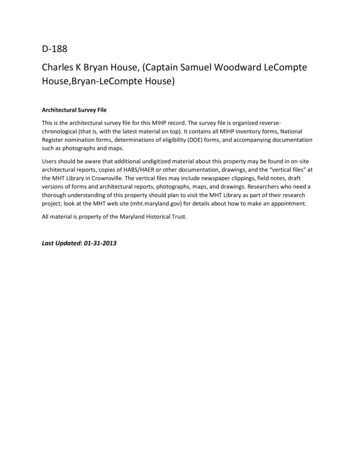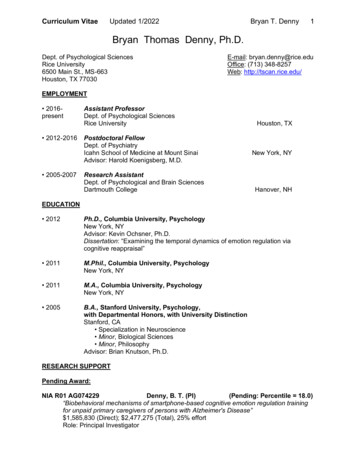
Transcription
Curriculum VitaeUpdated 1/2022Bryan T. Denny1Bryan Thomas Denny, Ph.D.Dept. of Psychological SciencesRice University6500 Main St., MS-663Houston, TX 77030E-mail: bryan.denny@rice.eduOffice: (713) 348-8257Web: http://tscan.rice.edu/EMPLOYMENT 2016present 2012-2016 2005-2007Assistant ProfessorDept. of Psychological SciencesRice UniversityPostdoctoral FellowDept. of PsychiatryIcahn School of Medicine at Mount SinaiAdvisor: Harold Koenigsberg, M.D.Research AssistantDept. of Psychological and Brain SciencesDartmouth CollegeHouston, TXNew York, NYHanover, NHEDUCATION 2012Ph.D., Columbia University, PsychologyNew York, NYAdvisor: Kevin Ochsner, Ph.D.Dissertation: “Examining the temporal dynamics of emotion regulation viacognitive reappraisal” 2011M.Phil., Columbia University, PsychologyNew York, NY 2011M.A., Columbia University, PsychologyNew York, NY 2005B.A., Stanford University, Psychology,with Departmental Honors, with University DistinctionStanford, CA Specialization in Neuroscience Minor, Biological Sciences Minor, PhilosophyAdvisor: Brian Knutson, Ph.D.RESEARCH SUPPORTPending Award:NIA R01 AG074229Denny, B. T. (PI)(Pending: Percentile 18.0)“Biobehavioral mechanisms of smartphone-based cognitive emotion regulation trainingfor unpaid primary caregivers of persons with Alzheimer's Disease” 1,585,830 (Direct); 2,477,275 (Total), 25% effortRole: Principal Investigator
Curriculum VitaeUpdated 1/2022Bryan T. Denny2NIA F31 AG074648Wu-Chung, E. L. (PI)(Pending: Impact Score 34)“From stress to dementia risk: An examination of psychological, affective, andneurobiological mechanisms underlying cognitive health and immune function” 174,505 (Total)Role: ConsultantCurrent / Awarded:Rice University SSRIDenny, B. T. (PI)2022-2023Rice University Social Sciences Research Institute (SSRI) Seed Money Grant“Investigating the neural mechanisms underlying emotion regulation training” 10,000Role: Principal InvestigatorNIMH R61/R33 MH125130Koenigsberg, H. W. (PI)2021-2023“Cognitive reappraisal training targeting emotion circuits as a therapeutic intervention inborderline patients” 2,916,770 (Direct); 4,799,017 (Total), 5% effortRole: Co-InvestigatorNIA R21 AG061597Denny, B. T. (PI), Fagundes, C. P. (MPI)2020-2022“Neural mechanisms of enhancing emotion regulation in bereaved spouses” 286,222 (Direct); 445,155 (Total), 20% effortRole: Principal Investigator (Contact PI)NIA R01 AG062690Fagundes, C. P. (PI)2019-2024“Individual differences in dementia spousal caregiver burden: A biobehavioral approach” 3,925,000 (Total), 10% effortRole: Co-InvestigatorRice University IDEAKing, D. D. (PI), Sano, A., & Denny, B. T. (Co-PI’s)2019-2021InterDisciplinary Excellence Award“Fostering positive emotions and psycho-physio resilience in job seekers and beyond” 74,967Role: Co-Principal Investigator (Co-PI)NEA 1855491-38-CFagundes, C. P. (PI)“Music creativity intervention for cognitively impaired patients” 300,000 (Total), cost share effortRole: Co-Investigator2019-2022NHLBI F31 HL147394Shahane, A. D. (PI)2019-2022“Psychological and inflammatory biobehavioral mechanisms underlying the associationbetween bereavement and cardiovascular disease” 221,916 (Total)Role: SponsorNSF 1853936DeLucia, P. (PI)2018-2022“REU Site: Translational Research in Psychological Sciences: Human Factors atRice University” 264,077 (Total)Role: Senior Personnel / Faculty Mentor
Curriculum VitaeUpdated 1/2022Bryan T. Denny3Completed:Rice UniversityDenny, B. T. (PI)2020-2021Dept. of Psychological Sciences COVID-19 Research Support“Emotion regulation during COVID-19 social distancing: Examining relationships withstress, health, and well-being” 1,000Role: Principal InvestigatorRice University FIFDenny, B. T. (PI), Fagundes, C. P. (Co-PI)Faculty Initiatives Fund Award“Neurobiological mechanisms of reappraisal training in bereaved spouses” 50,000Role: Principal Investigator2017-2019Baylor College of MedicineDenny, B. T. (PI)Core for Advanced Magnetic Resonance Imaging Pilot Time Award“Neurobiological mechanisms of reappraisal training in bereaved spouses” 5,000Role: Principal Investigator2016-2017NIMH F32 MH105119Denny, B. T. (PI)Ruth L. Kirschstein National Research Service Award (NRSA)Individual Postdoctoral Fellowship, National Institute of Mental Health“Predicting long-term clinical outcomes in borderline patients” 58,742 (Total)Role: Principal Investigator2015-2016Stanford UniversityStanford Undergraduate Research Programs (URP) Grant to supporthonors thesis research“Localizing neural responses to affective stimuli in depressed and healthyvolunteers” 4,3002004-2005AWARDS AND HONORS Finalist, Sophia Meyer Farb Prize for Teaching, Rice University, 2020. Nominee, Outstanding Undergraduate Research Mentor Award, Rice University, 2020. Poster Award, Social and Affective Neuroscience Society, 2019. Rising Star, Association for Psychological Science, 2018. Ruth L. Kirschstein F32 National Research Service Award (NRSA), NIMH/NIH, 2015-2016. Travel Award, Office of Postdoctoral Affairs, Icahn School of Medicine at Mount Sinai, 2015. Travel Award, Office of Postdoctoral Affairs, Icahn School of Medicine at Mount Sinai, 2013. Travel Award, Social and Affective Neuroscience Society, 2013. Travel Award, Columbia University, Dept. of Psychology, 2008-2012. Neuroscience Fellowship, Columbia University, Graduate School of Arts and Sciences,2010-2012. Faculty Fellowship, Columbia University, Graduate School of Arts and Sciences, 2007-2010. Phi Beta Kappa, Stanford University, 2005. University Distinction, Stanford University, 2005. Firestone Medal for Excellence in Undergraduate Research, Honorable Mention,Stanford University, 2005.
Curriculum VitaeUpdated 1/2022Bryan T. Denny4 Psi Chi, National Honor Society in Psychology, Stanford University, 2004. Robert C. Byrd Honors Scholarship, 2001-2005.PUBLICATIONS* Current or Former Lab Trainee Equal ContributionDicker, E. E.*, Jones, J. S.*, & Denny, B. T. (in press). Psychological distancing usage uniquelypredicts reduced perceived stress during the COVID-19 pandemic. Frontiers in Psychology.Shahane, A. D.*, & Denny, B. T. (in press). Emotion regulation and writing. To appear in G. L.Schiewer, J. Altarriba, & B. C. Ng (Eds.), Handbook of Language and Emotion. Berlin: DeGruyter Mouton.Wu-Chung, E. L., Leal, S. L., Denny, B. T., Cheng, S. L., & Fagundes C. P. (2022). Spousalcaregiving, widowhood, and cognition: A systematic review and a biopsychosocial framework forunderstanding the relationship between interpersonal losses and dementia risk in olderadulthood. Neuroscience & Biobehavioral Reviews, 134, 104487.Shahane, A. D.*, Pham, D. C.*, Lopez, R. B.*, & Denny, B. T. (2021). Novel computationalalgorithms to index lexical markers of psychological distancing and their relationship to emotionregulation efficacy over time. Affective Science, 2, 262-272.Shahane, A. D.*, Fagundes, C. P., Buka, S. L., & Denny, B. T. (2021). Associations betweenlinguistic markers of emotion regulation and cardiovascular disease-related inflammation.Psychoneuroimmunology Journal, 2, 1-8.Shahane, A. D.*, LeRoy, A. S., Denny, B. T., & Fagundes, C. P. (2020). Connecting cognition,cardiology, and chromosomes: Cognitive reappraisal impacts the relationship between heartrate variability and telomere length in CD8 CD28– cells. Psychoneuroendocrinology, 112,104517.Lopez, R. B.* , Brown, R. L. , Wu, E. L. , Murdock, K. W., Denny, B. T., Heijnen, C., &Fagundes, C. P. (2020). Emotion regulation and immune functioning during grief: testing therole of expressive suppression and cognitive reappraisal in inflammation among recentlybereaved spouses. Psychosomatic Medicine, 82(1), 2-9.Denny, B. T. (2020). Getting better over time: A framework for examining the impact of emotionregulation training. Emotion, 20(1), 110-114.Rubin-Falcone, H., Weber, J., Kishon, R., Ochsner, K. N., Delaparte, L., Dore, B.,Raman, S., Denny, B. T., Oquendo, M. A., Mann, J. J., & Miller, J. M. (2020). Neural predictorsand effects of cognitive behavioral therapy for depression: the role of emotional reactivity andregulation. Psychological Medicine, 50(1), 146-160.Lopez, R. B.*, & Denny, B. T. (2019). Negative affect mediates the relationship between use ofemotion regulation strategies and general health in college-aged students. Personality andIndividual Differences, 151, 109529.Shahane, A. D.*, & Denny, B. T. (2019). Predicting emotional health indicators from linguisticevidence of psychological distancing. Stress and Health, 35(2), 200-210.
Curriculum VitaeUpdated 1/2022Bryan T. Denny5Shahane, A. D.* , Lopez, R. B.* , & Denny, B. T. (2019). Implicit reappraisal as an emotionalbuffer: Reappraisal-related neural activity moderates the relationship between inattention andperceived stress during exposure to negative stimuli. Cognitive, Affective, and BehavioralNeuroscience, 19(2), 355-365.Lopez, R. B.*, Denny, B. T., & Fagundes, C. P. (2018). Neural mechanisms of emotionregulation and their role in endocrine and immune functioning: A review with implications fortreatment of affective disorders. Neuroscience and Biobehavioral Reviews, 95, 508-514.Reader, S.*, Lopez, R. B.*, & Denny, B. T. (2018). Cognitive reappraisal of low-caloriefood predicts real-world craving and consumption of high- and low-calorie foods in dailylife. Appetite, 131, 44-52.Denny, B. T., & Ochsner, K. N. (2018). Minding the emotional thermostat: Integrating socialcognitive and affective neuroscience evidence to form a model of the cognitive control ofemotion. In C. Schmahl, K. L. Phan, & R. O. Friedel (Eds.), Neurobiology of PersonalityDisorders (pp. 95-109). New York: Oxford University Press.Denny, B. T., Fan, J., Fels, S., Galitzer, H., Schiller, D., Siever, L. J., & Koenigsberg, H.W. (2018). Sensitization of the neural salience network to repeated emotional stimuli followinginitial habituation in patients with borderline personality disorder. The American Journal ofPsychiatry, 175(7), 657-664.Shahane, A. D.*, Fagundes, C. P., & Denny, B. T. (2018). Mending the heart and mind duringtimes of loss: A review of interventions to improve emotional well-being during spousalbereavement. Bereavement Care, 37(2), 44-54.Denny, B. T., Fan, J., Liu, X., Guerreri, S., Mayson, S. J., Rimsky, L., McMaster, A., Alexander,H., New, A. S., Goodman, M., Perez-Rodriguez, M., Siever, L. J., & Koenigsberg, H. W. (2016).Brain structural anomalies in borderline and avoidant personality disorder patients and theirassociations with disorder-specific symptoms. Journal of Affective Disorders, 200, 266-274.Denny, B. T., Inhoff, M. C., Zerubavel, N., Davachi, L., & Ochsner, K. N. (2015). Getting over it:Long-lasting effects of emotion regulation on amygdala response. Psychological Science, 26(9),1377-1388.Denny, B. T., Fan, J., Liu, X., Ochsner, K. N., Guerreri, S., Mayson, S. J., Rimsky, L.,McMaster, A., New, A. S., Goodman, M., Siever, L. J., & Koenigsberg, H. W. (2015). Elevatedamygdala activity during reappraisal anticipation predicts anxiety in avoidant personalitydisorder. Journal of Affective Disorders, 172, 1-7.Denny, B. T., Fan, J., Liu, X., Guerreri, S., Mayson, S. J., Rimsky, L., New, A. S., Siever, L. J.,& Koenigsberg, H. W. (2014). Insula-amygdala functional connectivity is correlated withhabituation to repeated negative images. Social Cognitive and Affective Neuroscience, 9(11),1660-1667.Denny, B. T., & Ochsner, K. N. (2014). Behavioral effects of longitudinal training in cognitivereappraisal. Emotion, 14(2), 425-433.Denny, B. T., Ochsner, K. N., Weber, J., & Wager, T. D. (2014). Anticipatory brain activitypredicts the success or failure of subsequent emotion regulation. Social Cognitive and AffectiveNeuroscience, 9(4), 403-411.
Curriculum VitaeUpdated 1/2022Bryan T. Denny6Koenigsberg, H. W., Denny, B. T., Fan, J., Liu, X., Guerreri, S., Mayson, S. J., Rimsky, L., New,A. S., Goodman, M., & Siever, L. J. (2014). The neural correlates of anomalous habituation tonegative emotional pictures in borderline and avoidant personality disorder patients. TheAmerican Journal of Psychiatry, 171(1), 82-90.Denny, B. T., Kober, H., Wager, T. D., & Ochsner, K. N. (2012). A meta-analysis of functionalneuroimaging studies of self- and other judgments reveals a spatial gradient for mentalizing inmedial prefrontal cortex. Journal of Cognitive Neuroscience, 24(8), 1742-1752.Denny, B. T., Silvers, J. A., & Ochsner, K. N. (2009). How we heal what we don’t want to feel:The functional neural architecture of emotion regulation. In A. M. Kring & D. M. Sloan (Eds.),Emotion regulation and psychopathology: A transdiagnostic approach to etiology and treatment(pp. 59-87). New York: Guilford Press.Heatherton, T. F., Wyland, C. L., Macrae, C. N., Demos, K. E., Denny, B. T., &Kelley, W. M. (2006). Medial prefrontal activity differentiates self from close others. SocialCognitive and Affective Neuroscience, 1, 18-25.Manuscripts Under Review/Revision (*Current or Former Lab Trainee)Shahane, A. D.*, Brown, R. L., Denny, B. T., & Fagundes, C. P. (under revision). Lexicalmarkers of cognitive reappraisal underlying the association between bereavement andcardiovascular disease.Dicker, E. E.*, Goodson, P. N.*, & Denny, B. T. (under review). The neuroscience of emotionregulation. To appear in: Oxford Bibliographies in Psychology. Oxford, UK: Oxford UniversityPress.Manuscripts In Preparation (*Current or Former Lab Trainee)Denny, B. T., Lopez, R. B.*, Chavez, J.*, Jones, J. S.*, Jungles, M.*, Goodson, P.*, &Dicker, E. E.* (in prep). Unpacking cognitive reappraisal: A meta-analysis of neuroimagingstudies of psychological distancing and reinterpretation.Dicker, E. E.*, Kunik, M. E., & Denny, B. T. (in prep). Intervention strategies targeting emotionregulation in primary caregivers of people with dementia.Goodson, P. N.*, Lopez, R. B.*, & Denny, B. T. (in prep). Perceived stress moderates emotionregulation success in real-world contexts.Shahane, A. D.*, Godfrey, D. A.*, Sabharwal, A., & Denny, B. T. (in prep). Predicting real-worldemotion and health indicators from spontaneously-assessed linguistic evidence of psychologicaldistancing using novel scalable technology.Goodson, P. N.*, & Denny, B. T. (in prep). Individual differences in emotion regulation: Role ofculture and cultural values.Denny, B. T., Lopez, R. B.*, Wu, E. L.*, Dicker, E. E.*, Goodson, P. N.*, Jungles, M.*, Fan, J.,Schulz, K., Ochsner, K. N., Trumbull, J., Lopez, M. M., Fels, S., Galitzer, H., Perez-Rodriguez,M., Rosell, D., Hazlett, E., McClure, M. M., New, A. S., & Koenigsberg, H. W. (in prep). Trainingin cognitive reappraisal in borderline personality disorder patients: Effects upon self-reportednegative affect and whole-brain pattern expression.
Curriculum VitaeUpdated 1/2022Bryan T. Denny7SYMPOSIUM PRESENTATIONS AND TALKSDenny, B. T. (2021, June). Examining the efficacy and mechanisms of emotion regulationtraining: Behavioral, linguistic, and neural evidence. Talk presented virtually at the Gulf CoastConsortia Mental Health Research Seminar.Denny, B. T. (2018, December). Neural mechanisms of enhancing emotion regulation viacognitive reappraisal in bereaved spouses. Talk presented at the annual meeting of theAmerican College of Neuropsychopharmacology, Hollywood, FL.Denny, B. T. (2018, May). Enhancing emotion regulation through longitudinal training incognitive reappraisal: A translational social cognitive neuroscience approach. Talk presented atthe annual meeting of the Society of Biological Psychiatry, New York, NY.Denny, B. T. (2017, November). Examining translational impacts of emotion regulation from asocial cognitive neuroscience perspective. Talk presented at CogTea area meeting, RiceUniversity, Houston, TX.Denny, B. T. (2017, February). Examining the impact of longitudinal cognitive emotionregulation training in healthy and affectively-disordered populations: Evidence frompsychological and neural indices of affect and regulatory success. Talk presented at CogTeaarea meeting, Rice University, Houston, TX.Denny, B. T., Inhoff, M. C., Zerubavel, N., Davachi, L., & Ochsner, K. N. (2016, October).Finding the right ingredients: Comparing the psychological and neural mechanisms supportinglongitudinal emotion regulation training success via distancing and reinterpretation. Talkpresented at the 50th Annual Meeting of the Association for Behavioral and Cognitive Therapies,New York, NY.Denny, B. T., Fan, J., Liu, X., Ochsner, K. N., Mayson, S. J., Rimsky, L., McMaster, A.,Alexander, H., New, A. S., Goodman, M., Siever, L. J., & Koenigsberg, H. W. (2016, June). Canpeople be trained to be better emotion regulators? Evidence that longitudinal reappraisaltraining reduces self-reported negative emotion and amygdala activity and increases prefrontalcortex activity in borderline personality disorder patients. Talk presented at the annual meetingof the Australasian Society for Social and Affective Neuroscience, Sydney, Australia.Denny, B. T., Fan, J., Liu, X., Ochsner, K. N., Mayson, S. J., Rimsky, L., McMaster, A.,Alexander, H., New, A. S., Goodman, M., Siever, L. J., & Koenigsberg, H. W. (2015, October).Can people be trained to be better emotion regulators? Evidence that longitudinal reappraisaltraining reduces self-reported negative emotion and amygdala activity and increases prefrontalcortex activity in borderline personality disorder patients. Talk presented at the 45th AnnualMeeting of the Society for Neuroscience, Chicago, IL.Denny, B. T. (2015, October). Can people be trained to be better emotion regulators? Evidencethat longitudinal reappraisal training reduces self-reported negative emotion and amygdalaactivity and increases prefrontal cortex activity in borderline personality disorder patients. Talkpresented at the Brain Imaging Center Annual Symposium, Icahn School of Medicine at MountSinai, New York, NY.
Curriculum VitaeUpdated 1/2022Bryan T. Denny8Denny, B. T., Fan, J., Liu, X., Ochsner, K. N., Guerreri, S., Mayson, S. J., Rimsky, L.,McMaster, A., Alexander, H., New, A. S., Goodman, M., Siever, L. J., & Koenigsberg, H. W.(2015, May). Can emotion regulation be trained? Evidence that longitudinal reappraisal trainingreduces elevated negative emotion and amygdala reactivity and engages prefrontal cortexactivity in borderline personality disorder. Talk presented at the 27th Annual Convention of theAssociation for Psychological Science, New York, NY.Denny, B. T., Inhoff, M. C., Zerubavel, N., Davachi, L., & Ochsner, K. N. (2015, May). DoesTraining Help? Behavioral And Neural Impacts Of Longitudinal Emotion Regulation Training ToEnhance Cognitive Reappraisal In Healthy Adults. Talk presented at the annual meeting of theSociety of Biological Psychiatry, Toronto, Canada.Denny, B. T. (2015, May). Can we become better emotion regulators through training?Examining reappraisal training in healthy individuals and borderline personality disorderpatients. Talk presented at interdepartmental Cognition Club meeting at the Icahn School ofMedicine at Mount Sinai, New York, NY.Denny, B. T. (2014, May). Examining emotional habituation to repeated negative stimuli inborderline personality disorder patients and healthy controls: Evidence for differential patterns ofbehavior, neural activity, and functional connectivity. Talk presented at the 6th Annual FriedmanBrain Institute Neuroscience Retreat, Icahn School of Medicine at Mount Sinai, New YorkAcademy of Medicine, New York, NY.Denny, B. T. (2014, May). Examining emotional habituation to repeated negative stimuli inborderline personality disorder patients and healthy controls: Evidence for differential patterns ofbehavior, neural activity, and functional connectivity. Talk presented at interdepartmentalCognition Club meeting at the Icahn School of Medicine at Mount Sinai, New York, NY.Denny, B. T., Fan, J., Liu, X., Guerreri, S., Mayson, S. J., Rimsky, L., New, A. S., Siever, L. J.,& Koenigsberg, H. W. (2013, November). Easier the second time around: Functionalconnectivity between insula and amygdala predicts habituation to repeated negative images.Talk presented at the 43rd Annual Meeting of the Society for Neuroscience, San Diego, CA.Denny, B. T. (2013, May). Neural mechanisms of habituation in healthy adults and borderlineand avoidant personality disorder patients: Functional connectivity between insula andamygdala predicts habitation to repeated negative images. Talk presented at the Mount SinaiTranslational and Molecular Imaging Institute (TMII) Neuroimaging Journal Club meeting, NewYork, NY.Denny, B. T., Inhoff, M., Zerubavel, N., Davachi, L., & Ochsner, K. N. (2013, April). Whatdetermines whether the effects of emotion regulation will last? Talk presented at the annualmeeting of the Social and Affective Neuroscience Society, San Francisco, CA.Denny, B. T., Inhoff, M., Zerubavel, N., Davachi, L., & Ochsner, K. N. (2012, October). Whatdetermines whether the effects of emotion regulation will last? Talk presented at the 42nd AnnualMeeting of the Society for Neuroscience. New Orleans, LA.Denny, B. T. (2012, October). What determines whether the effects of emotion regulation willlast? Investigating the neural mechanisms underlying sustained effects of reappraisal practice.Talk presented at Social Cognitive Neuroscience Lab Meeting (PI: Kevin Ochsner), ColumbiaUniversity Dept. of Psychology, New York, NY.
Curriculum VitaeUpdated 1/2022Bryan T. Denny9Denny, B. T. (2012, October). What determines whether the effects of emotion regulation willlast? Talk presented at Columbia University Dept. of Psychology Cognitive Area Meeting. NewYork, NY.Denny, B. T. (2012, March). Examining the temporal dynamics of emotion regulation viacognitive reappraisal. Talk presented at Columbia University Dept. of PsychologySocial/Personality Area Meeting. New York, NY.INVITED TALKSDenny, B. T. (2021, November). How can we become better emotion regulators?Training and implementing emotion regulation skills as an essential component of mentalhealth. Invited talk given at MD/PhD student seminar, McGovern Medical School, University ofTexas Health Science Center at Houston.Denny, B. T. (2019, May). Can we become better emotion regulators with training? Invited talkgiven at the Automaticity, Affect, Control, and Thought (AACT) Lab Meeting (PI: Kateri McRae),University of Denver, Denver, CO.Denny, B. T. (2016, March). Can training enhance emotion regulation outcomes?Evidence from a translational social cognitive neuroscience perspective in healthy individualsand borderline personality disorder patients. Invited talk presented to the Department ofPsychology, Rice University, Houston, TX.Denny, B. T. (2015, June). Can we become better emotion regulators through training?Examining reappraisal training in healthy individuals and borderline personality disorderpatients. Invited talk presented at the Mood and Anxiety Program (MAP) Science Meeting, IcahnSchool of Medicine at Mount Sinai, New York, NY.Denny, B. T. (2015, April). Can we become better emotion regulators through training?Examining reappraisal training in healthy individuals and borderline personality disorderpatients. Invited talk given at Clinical and Affective Neuroscience Lab Meeting (PI: Hedy Kober),Yale University Dept. of Psychiatry, New Haven, CT.Denny, B. T. (2014, April). Examining emotional habituation to repeated negative stimuli inborderline personality disorder patients and healthy controls: Evidence for differential patterns ofbehavior, neural activity, and functional connectivity. Invited talk presented at Mood and AnxietyDisorders Program Depression Club meeting at the Icahn School of Medicine at Mount Sinai,New York, NY.Denny, B. T. (2012, November). When and how can effects of emotion regulation persist?Evidence from reappraisal training. Invited talk given at Clinical and Affective Neuroscience LabMeeting (PI: Hedy Kober), Yale University Dept. of Psychiatry, New Haven, CT.CHAIRED SYMPOSIADenny, B. T. (2013, November). Fear, stress, and social networks. Symposium conducted atthe 43rd Annual Meeting of the Society for Neuroscience. San Diego, CA.
Curriculum VitaeUpdated 1/2022Bryan T. Denny10ABSTRACTS / POSTERS (*Current or Former Lab Trainee)Dicker, E. E.*, Jones, J. S.*, & Denny, B. T. (2021). Psychological distancing usage uniquelypredicts reduced perceived stress during the COVID-19 pandemic. Poster session presented atthe 27th Annual Neuroscience Poster Session, UT Health Science Center at Houston, Houston,TX.Dicker, E. E.*, Leal, L. S., Fagundes, C. P, & Denny, B. T. (2021). Exploring the interactionbetween emotion regulation and inflammation on changes in episodic memory in older adults.Poster session presented at the Society for Neuroscience’s virtual Neuroscience 2021conference.Dicker, E. E.*, Jones, J. S.*, & Denny, B. T. (2021). Psychological distancing usage uniquelypredicts reduced perceived stress during the COVID-19 pandemic. Poster session presented atthe 3rd Annual Gulf Coast Consortia Mental Health Research Symposium.Denny, B. T., Lopez, R. B.*, Goodson, P. G.*, Chavez, J.*, Jones, J. S.*, Jungles, M.*, &Dicker, E. E.* (2021). Unpacking cognitive reappraisal: A meta-analysis of neuroimaging studiesof psychological distancing and reinterpretation. Poster session presented at the 27th AnnualNeuroscience Poster Session, UT Health Science Center at Houston, Houston, TX. (*P. G.Goodson, presenting author).Goodson, P. N.*, Lopez, R. B.*, & Denny, B. T. (2021). Perceived stress moderates emotionregulation success in real-world contexts. Poster session presented at the 3rd Annual GulfCoast Consortia Mental Health Research Symposium.Denny, B. T., Lopez, R. B.*, Chavez, J.*, Jones, J. S.*, Goodson, P.*, & Dicker, E. E.* (2021).Unpacking cognitive reappraisal: A meta-analysis of neuroimaging studies of psychologicaldistancing and reinterpretation. Poster session presented at the virtual annual meeting of theAssociation for Psychological Science.Dicker, E. E.*, Jones, J. S.*, & Denny, B. T. (2021). Psychological distancing usage uniquelypredicts reduced perceived stress during the COVID-19 pandemic. Poster session presented atthe virtual annual meeting of the Association for Psychological Science.Shahane, A. D.*, LeRoy, A.S., Denny, B. T., & Fagundes, C.P. (2021). Connecting cognition,cardiology, and chromosomes: Cognitive reappraisal impacts the relationship between heartrate variability and telomere length in CD8 CD28– cells. Poster session presented at virtualannual meeting of the Social & Affective Neuroscience Society.**Poster Award WinnerDicker, E. E.*, Jones, J. S.*, & Denny, B. T. (2021). Psychological distancing usage uniquelypredicts reduced perceived stress during the COVID-19 pandemic. Poster session presented atthe virtual annual meeting of the Social and Affective Neuroscience Society.Shahane, A. D.*, LeRoy, A.S., Denny, B. T., Fagundes, C.P. (2021). Connecting cognition,cardiology, and chromosomes: Cognitive reappraisal impacts the relationship between heartrate variability and telomere length in CD8 CD28– cells. Poster session presented at thePsychoneuroimmunology Research Society (PNIRS) annual meeting.Shahane, A. D.*, Pham, D. C.*, Lopez, R. B.*, & Denny, B. T. (2021). Novel computationalalgorithms to index lexical markers of psychological distancing and their relationship to emotionregulation efficacy, psychophysiology, and mental health. Presentation at virtual annual meetingof the Society for Affective Science. **Abstract Selected for Publication
Curriculum VitaeUpdated 1/2022Bryan T. Denny11Dicker, E. E.*, Jones, J. S.*, & Denny, B. T. (2021). Psychological distancing usage uniquelypredicts reduced perceived stress during the COVID-19 pandemic. Poster session presented atthe virtual annual meeting of the Social for Affective Science.Shahane, A. D.*, Lopez, R. B.*, & Denny, B. T. (2019). Training-induced changes in a wholebrain signature of cognitive reappraisal are related to reductions in grief and depressivesymptoms in bereaved spouses. Poster session presented at the 26th Annual NeurosciencePoster Session, UT Health Science Center at Houston, Houston, TX. 1st Prize for GraduateStudent Poster.Denny, B. T., Lopez, R. B.*, Fan, J., Schulz, K., & Koenigsberg, H. W. (2019). Longitudinaltraining in cognitive reappraisal enhances emotion regulation success in borderline personalitydisorder patients: evidence from self-reported negative affect and whole-brain patternexpression. Poster session presented at the annual meeting of the Social and AffectiveNeuroscience Society, Miami, FL. SANS Poster Award.Shahane, A. D.*, Lopez, R. B.*, & Denny, B. T. (2019). Training-induced changes in a wholebrain signature of cognitive reappraisal are related to reductions in grief and depressivesymptoms in bereaved spouses. Poster session presented at the annual meeting of the Socialand Affective Neuroscience Society, Miami, FL.Shahane, A. D.*, Lopez, R. B.*, & Denny, B. T. (2019). Unconscious emotion regulation isprotective? Emotion regulation-related brain activity moderates the link between inattention andperceived stress during exposure to negative stimuli. Poster session presented at the annualmeeting of the Society for Personality and Social Psychology, Portland, OR.Lopez, R. B.*, Reader, S. W.*, & Denny, B. T. (2019). Individual differences in cognitivereappraisal of high- and low-calorie foods are associated with real world eating patterns. Postersession presented at the annual meeting of the Society for Personality and Social Psychology,Portland, OR.Shahane, A. D.*, Lopez, R. B.*, & Denny, B. T. (2018). Implicit reappraisal as an emotionalbuffer: Reappraisal-related neural activity moderates the relationship between inattention andperceived stress during exposure to negative stimuli. Poster session presented at the 25thAnnual Neuroscience Poster Session, UT Health Science Center at Houston, Houston, TX.Shahane, A. D.*, Lopez, R. B.*, & Denny, B. T. (2018). Spontaneous recruitmen
2016 Curriculum Vitae Updated 1/2022 Bryan T. Denny 1 Bryan Thomas Denny, Ph.D. Dept. of Psychological Sciences . E-mail: bryan.denny@rice.edu Rice University . Office: (713) 348-8257
